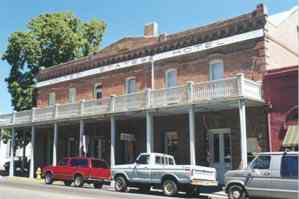Rutherfraud B. Hayes and the (S)election of 1876
Rutherfraud B. Hayes and the (S)election of 1876

U.S. Hotel - 1880 Built by George Holt for his fiancee Madame Jeanne De Reboam. The first guest was President Rutherford B. Hayes.
Courtesy Dolores Steele
This is the United States Hotel in Jacksonville, Oregon. It was built in 1880 and one of its first famous guests was President Rutherford B. Hayes. President Hayes, however, was one of the most infamous presidents in American history. He only served one term, but it was
how he became President that made him truly infamous.
The election of 1876 pitted Democratic Party nominee Samuel J. Tilden, the distinguished Governor of New York famous for exposing William "Boss" Tweed as a corrupt leader of the Tweed Ring within Tammany Hall, which was an engine for graft and corruption in New York City during the Gilded Age, against Republican Party nominee Rutherford B. Hayes, the Governor of Ohio who was the choice when the convention had stalled after six ballots. According to historian
Henry Adams, Hayes was chosen as, "a third rate nonentity, whose only recommendation is that he is obnoxious to no one" and "necessary for party harmony." When all the votes were counted, Tilden had clearly won the popular vote, 4,284,000 to Hayes' 4,037,000.
But as anyone who followed the hanging chad cliffhanger in 2000 knows, U.S. Presidential elections are never decided by popular vote, but through the electoral college. Tilden was ahead of Hayes in that arena, 184 electoral votes to 165. However, there were 20 electoral votes unresolved. In three southern states, South Carolina, Florida and Louisiana, each party declared that its candidate had won the state. There was also a dispute in
Oregon because one of the state's electors, deputy postmaster John W. Watts, had his vote declared invalid by Oregon Governor La Fayette Grover. Grover, a Democrat, declared that Watts, a Republican Hayes supporter, violated the rule prohibiting electors from holding a federally appointed office.
So what does the U.S. Constitution say should happen when there is not a clear winner in the electoral college? This was clarified by the
12th Amendment ratified in 1804, which states that if no candidate has a majority of electoral votes, the House of Representatives, with each state delegation having one vote, chooses the President and the Senate, with each Senator having one vote, chooses the Vice President. But instead of following this Constitutional procedure, Congress passed a law on January 29, 1877 forming a
15-member commission to settle the result.
read more at link...
http://americanjudas.blogspot.com/2016/11/rutherfraud-b-hayes-and-selection-of.html
Or just watch the video:
